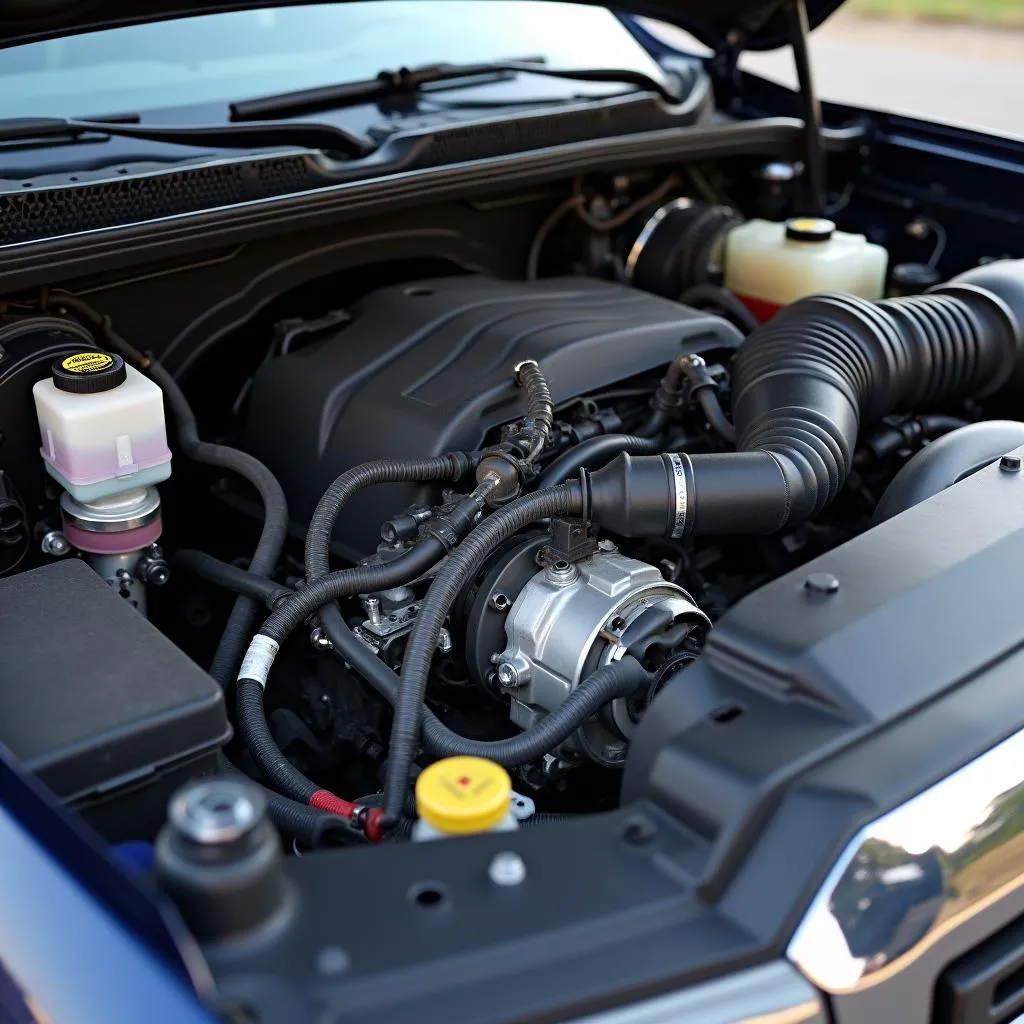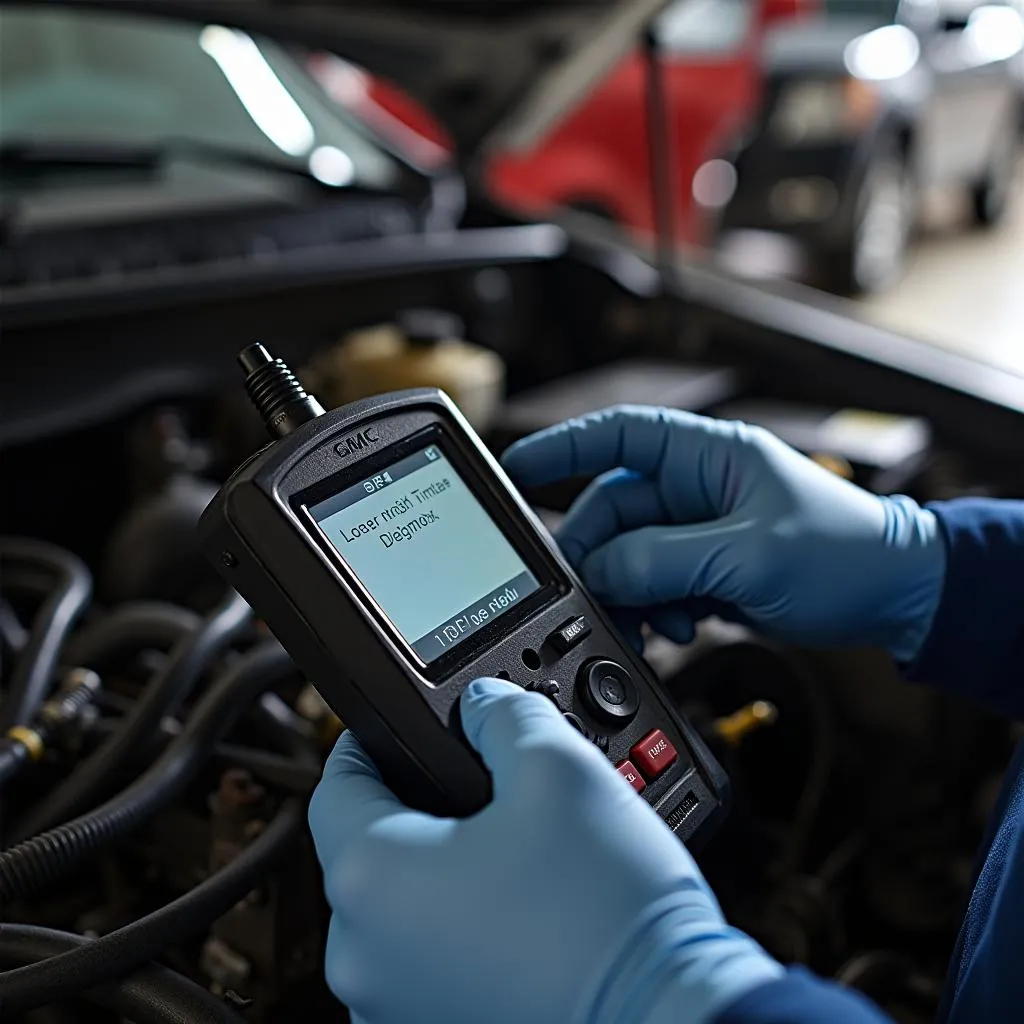Imagine this: You’re cruising down the Pacific Coast Highway in your trusty GMC Sierra, the California sun warming your face. Suddenly, your “Check Engine” light throws shade on your perfect day. You pull over, heart sinking, wondering what could be wrong. A quick scan with your OBD-II reader reveals the dreaded code PO300 – Random/Multiple Cylinder Misfire Detected. Don’t panic! This guide will walk you through everything you need to know about this common GMC trouble code.
Decoding the Mystery: What is P0300?
The P0300 code is a general OBD-II code, meaning it’s used across various makes and models, including GMC vehicles. Let’s break down what this code means:
- P0300: This alphanumeric code identifies the specific problem area within your vehicle’s system.
- Random/Multiple Cylinder Misfire: This tells us the engine isn’t firing properly in one or more cylinders. The “random” aspect indicates the misfires aren’t consistently happening in a specific cylinder.
In layman’s terms, your engine isn’t running as smoothly as it should be.
The P0300 Code: Why Should You Care?
Ignoring a P0300 code can lead to more severe engine problems and costly repairs down the road. Here’s why you should address this issue promptly:
- Reduced Performance: Misfires rob your engine of power, leading to sluggish acceleration and decreased fuel efficiency.
- Catalytic Converter Damage: Unburnt fuel from misfires can damage your catalytic converter, a costly component to replace.
- Increased Emissions: Misfires increase harmful emissions, impacting air quality and potentially causing you to fail emissions tests.
Common Culprits Behind the P0300 Code
Several culprits can trigger a P0300 code in your GMC. Here are some of the most common:
- Faulty Spark Plugs or Wires: Worn-out spark plugs or damaged wires can disrupt the ignition process, causing misfires.
- Vacuum Leaks: Leaks in the intake manifold or vacuum hoses can disrupt the air-fuel mixture, leading to misfires.
- Fuel System Issues: Problems with the fuel injectors, fuel pump, or fuel filter can prevent the proper amount of fuel from reaching the cylinders.
- Ignition System Malfunctions: Issues with the ignition coil, distributor cap, or rotor (depending on your engine type) can also cause misfires.
- Sensor Problems: Faulty sensors, such as the mass airflow sensor (MAF) or oxygen sensor (O2), can provide incorrect data to the engine control unit (ECU), affecting the air-fuel mixture.
 GMC Sierra Engine Bay
GMC Sierra Engine Bay
Troubleshooting and Resolving P0300
Diagnosing the exact cause of the P0300 code requires a systematic approach. Here’s a step-by-step guide:
- Check for Other Codes: Often, the P0300 code is accompanied by other codes, such as P0301 (Cylinder 1 Misfire), P0302 (Cylinder 2 Misfire), and so on. These additional codes can pinpoint the problematic cylinder(s), making diagnosis easier.
- Inspect the Spark Plugs and Wires: Start with the basics. Examine your spark plugs for wear and tear, such as excessive gaps or deposits. Check the spark plug wires for cracks, burns, or loose connections.
- Inspect for Vacuum Leaks: Listen for hissing sounds coming from the engine bay, which might indicate a vacuum leak. Use a carburetor cleaner or a smoke machine to pinpoint the leak’s location.
- Test the Fuel System: Check the fuel pressure using a fuel pressure gauge to ensure the fuel pump is delivering adequate pressure. Inspect the fuel injectors for clogs or leaks.
- Examine the Ignition System: Depending on your engine, check the ignition coil, distributor cap, and rotor for damage or wear.
- Inspect Sensors: Use an OBD-II scanner to check for sensor readings outside the normal range, particularly the MAF and O2 sensors.
It’s crucial to remember that diagnosing and repairing complex engine issues often require specialized tools and knowledge. If you’re unsure about any step, consult a qualified mechanic or a GMC dealership for assistance.
Preventive Measures: Keeping the P0300 Code at Bay
Prevention is always better than cure. Here are some preventive measures to reduce the likelihood of encountering the P0300 code:
- Regular Maintenance: Follow the recommended maintenance schedule in your GMC owner’s manual for spark plug replacements, air filter changes, and fuel system cleaning.
- Quality Fuel and Additives: Use high-quality fuel and consider using fuel system cleaners periodically to prevent deposit buildup in the fuel injectors.
- Address Engine Issues Promptly: Don’t ignore minor engine hiccups or warning lights. Addressing issues early can prevent them from escalating into major problems.
 Mechanic Diagnosing GMC Engine
Mechanic Diagnosing GMC Engine
Frequently Asked Questions about the P0300 Code
Q: Can I still drive my GMC with a P0300 code?
A: While you might be able to drive short distances, it’s not recommended. Driving with misfires can lead to further engine damage and potentially leave you stranded.
Q: How much does it cost to fix a P0300 code?
A: The repair cost depends on the underlying cause. Simple fixes like spark plug replacements can be relatively inexpensive, while issues like faulty fuel injectors or catalytic converter damage can be significantly more costly.
Q: Can a bad battery cause a P0300 code?
A: While a weak battery can sometimes cause misfire-like symptoms, it’s unlikely to trigger a P0300 code directly.
Similar GMC OBD-II Codes
- P0301 – P0308: These codes indicate misfires in specific cylinders, helping narrow down the diagnosis.
- P0171: System Too Lean (Bank 1)
- P0174: System Too Lean (Bank 2)
- P0420: Catalyst System Efficiency Below Threshold (Bank 1)
- P0430: Catalyst System Efficiency Below Threshold (Bank 2)
These codes often occur alongside a P0300 and provide further clues about potential issues within the fuel and emissions systems.
Need Help with Your GMC Diagnostics?
Experiencing car trouble can be frustrating. If you’re struggling with a P0300 code or any other diagnostic issue, our team of expert automotive technicians is here to help. Contact us on WhatsApp at +84767531508 for 24/7 support and guidance on diagnostic tools and software.
Remember, a well-maintained vehicle is a happy vehicle. Stay proactive with your GMC’s maintenance, and don’t let the P0300 code ruin your next road trip!
